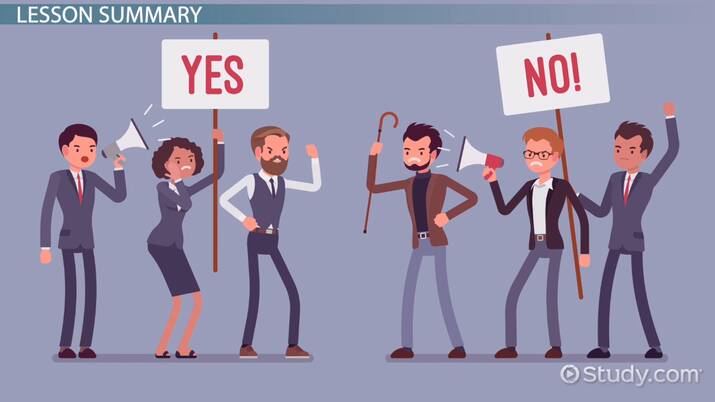
Introduction:
Arguments are a common occurrence in groups, and can be both positive and negative. When arguments are constructive, they help to improve the group’s communication and decision-making process. However, when arguments become destructive, they can lead to disharmony and conflict. It is important to remember that all arguments should be treated fairly and with respect for all involved.
Arguments are a part of every group. Whether you are at the grocery store, at work, or with your friends, arguments happen. They can be small disagreements that lead to bigger ones, or they can be simple disagreements that don’t lead to conflict. Arguments can be fun or frustrating, and they are an essential part of any relationship.
Arguments can also be helpful when we are trying to figure out what someone else is thinking or feeling. They can help us understand their perspective and get a better understanding of the situation.
The different types of arguments:
When most people think of arguments, they think of heated debates where each person is trying to win. But there are actually different types of arguments, and each has its own purpose. In this article, we’ll explore the different types of arguments and discuss when it’s appropriate to use each one.
One type of argument is the deductive argument. This type is used to prove a point by starting with a general statement and then using specific examples to support it. Deductive arguments are often used in law or philosophy, where you need to make a case for your position using evidence.
Another type of argument is the inductive argument. This type is used to build a case by starting with specific examples and then drawing conclusions from them. Inductive arguments are often used in science, where you’re trying to figure out how something works by observing its individual parts.
Example 1: If a person has a high IQ, he/she will have more success in life.
An inductive argument is used to support this statement.
Example 2: The CEO of the company has an IQ of 120 and the company is doing well. A deductive argument is used to support this statement.
Inductive and deductive arguments are both supported by the same logic.
The Pros and Cons of Group Discussion:
Group discussion is a process of deliberation where a group of individuals come together to exchange and share ideas. It has both pros and cons that should be considered before using it in the workplace. The pros of group discussion are that it can lead to better decision making, allows for different perspectives to be heard, and can help build team cohesion. The cons of group discussion are that it can be disruptive, lead to conflict, and take more time than individual decision making. When used effectively, group discussion can be a powerful tool for problem solving and communication. However, when not used effectively, it can lead to wasted time and conflict.

How to handle an argument:
Arguments are a part of life. We argue with our spouses, our friends, our family, and even strangers.
If you’ve been in an argument and it didn’t go as well as you’d like, here are some tips to help get your point across:
- Know how you feel about the other person. If you’re angry, try and let your emotions show.
- Try and see the situation from their point of view.
- Listen to the other person. Often, when we’re in the middle of an argument, we’re so focused on making our point that we don’t actually listen to what the other person is saying. Try to focus on what the other person is saying and see if there’s any truth to it.
- Be prepared to apologize if you’re wrong, even if it means apologizing when it’s not necessary (i.e., in the middle of an argument).
- Try and stay calm, even if you feel angry or frustrated.
- Stop talking if you’re angry. Just don’t say anything else.
- Try and be assertive, but not aggressive. If you have to say something, try and keep it as short as possible (no more than 2 or 3 sentences).
- Talk about yourself and not about your partner.
- Don’t attack the other person’s character. When we’re angry, it’s easy to start attacking the other person’s character. This is a mistake. You may want to respond to the other person’s behavior, but don’t attack their character.
What to Do When an Argument Gets Out of Hand
In any relationship, there will be times when disagreements turn into full-blown arguments. While it’s normal to feel upset during these moments, it’s important to remember how to handle yourself and the situation in order to resolve things as quickly and peacefully as possible. Here are a few tips:
- Stay calm. This may be difficult, but it’s important to try to stay levelheaded. Screaming or yelling will only make the situation worse.
- Don’t take things personally. Remember that this is about the argument, not about you personally.
- Avoid name-calling or insults. Doing so will only further escalate the argument and make it harder to resolve things peacefully.
- Be willing to compromise. No one is going to get their way 100% of the time, so be prepared to meet in the middle occasionally.
Tips for Resolving Group Conflicts
Conflict is a natural and inevitable part of group life. It can arise from different personalities, values, or goals. When conflicts occur, they can hinder productivity and creativity. However, with some effort, most conflicts can be resolved. The following tips can help:

- Acknowledge the conflict. Don’t try to ignore it or hope it will go away on its own. Address the issue head-on and express your feelings honestly.
- Be open to negotiation. Try to see the conflict from the other person’s perspective and be willing to compromise.
- Use positive communication techniques. Avoid accusing or insulting the other person, and use respectful language instead.
- Stay calm and objective. Don’t let your emotions get in the way of resolving the conflict. Be assertive but not aggressive.
Dealing with Difficult People in Groups
In any group setting there will be people who are difficult to work with. These people can be frustrating, demanding, and often counterproductive. However, there are ways to deal with them that can minimize the negative impact they have on the group. First, it is important to understand what might be causing the person to act in this way. It could be that they are struggling with a personal issue, or they may not feel comfortable in the group setting. Once you understand the cause, you can try to address it directly or provide support. Additionally, it is helpful to set boundaries for how much of your time and energy you are willing to invest in dealing with this person. Finally, remain positive and constructive when interacting with them, even when they are being difficult.
The consequences of arguing:
No one enjoys a good argument. They can be messy, unpleasant, and leave everyone feeling drained. But what are the consequences of arguing?
Research shows that arguing can have a number of negative consequences for both individuals and relationships. For example, when people argue they tend to experience increased levels of stress, anxiety, and anger. This can lead to health problems such as headaches, stomach aches, and even heart disease.
Arguing can also damage relationships. It can cause partners to feel less close to each other and lead to decreased levels of trust and intimacy. In fact, studies show that couples who argue frequently are more likely to get divorced than those who don’t.
So next time you feel like shouting at your partner or getting into a heated debate with a friend, think twice. The consequences may not be worth it.
Conclusion:
In conclusion, group arguments can be productive when all members are willing to listen and share their ideas. However, if one or more members are not interested in having a productive discussion, the argument will likely result in frustration and little progress. In order to have a successful group argument, it is important that all participants are respectful of each other and willing to compromise.
Written by ADE – Naijatipsland










